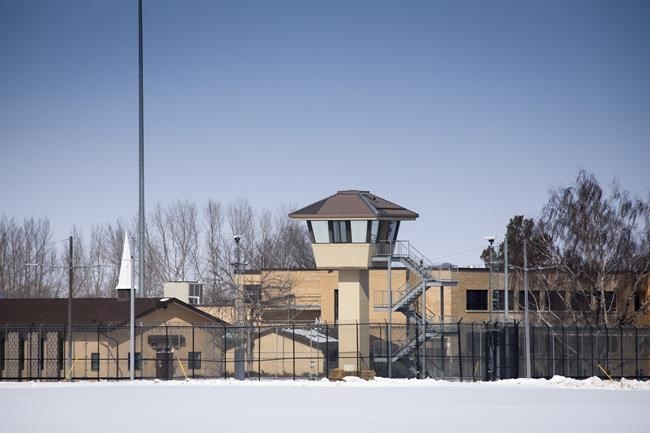VANCOUVER — Government medical professionals say Canada's jails and prisons don't meet with physical distancing guidelines for COVID-19 and they want as many inmates as possible to be released.
In an open letter to the federal, provincial and territorial governments, more than 100 doctors, nurses and other health professionals say inmates are already medically vulnerable and are likely to have infectious diseases, such as hepatitis C and HIV.
The letter calls on the governments "to stop admitting people to jails and prisons unless absolutely necessary." The medical professionals who work for the governments also want assurances that inmates who are released get the housing, food and health care they need in the community.
Ontario, British Columbia and the Northwest Territories have freed some inmates because of the pandemic.
Kristy Denette, a spokeswoman the Ministry of the Solicitor General in Ontario, said the government has been working with the courts and police to reduce the number of people in custody while ensuring public safety isn't compromised.
Since March 16, the population at all facilities across Ontario has dropped from 8,344 to 6,148, she said. Nine low-risk offenders close to the end of their sentences were also released under temporary absence passes, she added.
In B.C., 95 inmates have been granted early release under a temporary absence, which can be rescinded if necessary, said the Public Safety Ministry.
Justice Minister Caroline Wawzonek of the Northwest Territories said seven inmates have been granted temporary absences. Prisoners on intermittent sentences have also been given temporary absences.
Public Safety Minister Bill Blair has asked the commissioner of the correctional service and the chair of the Parole Board to determine if certain offenders could be released early, says a statement from his office released Tuesday.
"Our greatest responsibility is keeping Canadians safe. That includes all correctional staff, inmates and the Canadian public. We know the unique risks inherent to prisons," it says.
The correctional service is taking steps to restrict the spread of COVID-19, the statement says.
Iulia Pescarus Popa of the Parole Board said it is steamlining its processes to respond to the pandemic.
The board is processing exceptional cases as quickly as possible for those offenders who are terminally ill or whose physical or mental health is likely to be affected while in prison, Popa said in a statement.
She said when making conditional release decisions, the board considers all relevant information related to an offender's case, including the gravity of the offence and the individual's health.
Figures from the correctional service show 21 inmates tested positive for the virus as of Monday: 12 in Quebec, seven in Ontario and two in B.C.
The letter from the medical professionals says if people in prison become infected, it would be essentially impossible to stop the spread of COVID-19 in a correctional facility.
Conditions are crowded, prisoners share cells, they must be frisked and handcuffed by officers, line up daily for medication, share common spaces and dining halls, and use the same telephones and washrooms, it says.
"They also lack access to some of the critical supplies people in the community are using to keep themselves safe, such as hand sanitizer, cleaning products and sometimes soap."
The Union of Canadian Correctional Officers, which represents federal prison guards, said last week that it has put measures in place to protect its members and limit the spread of the virus.
"The release of a few inmates would not solve the potential spread of COVID-19 in our facilities; it would only increase the risk for Canadians," the union says in a statement.
One inmate has tested positive for the virus in a B.C. jail.
Stephanie Smith, president of the B.C. Government and Service Employees' Union, said her members have concerns about the safety of themselves and the inmates.
She said the union, which represents about 1,700 guards in provincial jails, is doing a risk assessment and has called for a ban on the double bunking of inmates.
— With files from Bob Weber in Edmonton.
This report by The Canadian Press was first published April 7, 2020.
Terri Theodore, The Canadian Press




